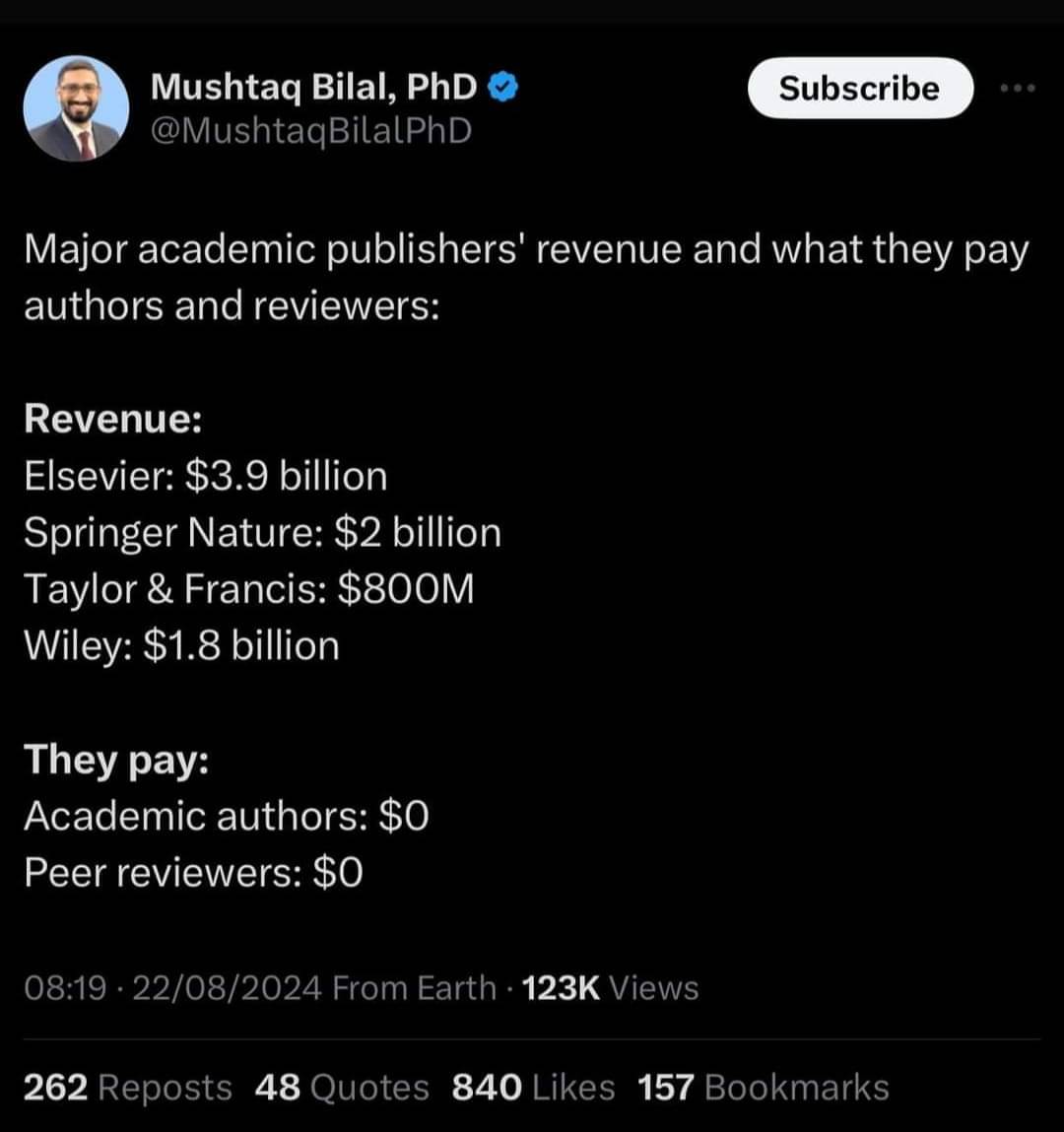this post was submitted on 24 Aug 2024
421 points (99.1% liked)
Piracy: ꜱᴀɪʟ ᴛʜᴇ ʜɪɢʜ ꜱᴇᴀꜱ
55085 readers
312 users here now
⚓ Dedicated to the discussion of digital piracy, including ethical problems and legal advancements.
Rules • Full Version
1. Posts must be related to the discussion of digital piracy
2. Don't request invites, trade, sell, or self-promote
3. Don't request or link to specific pirated titles, including DMs
4. Don't submit low-quality posts, be entitled, or harass others
Loot, Pillage, & Plunder
📜 c/Piracy Wiki (Community Edition):
💰 Please help cover server costs.
 |
 |
|---|---|
| Ko-fi | Liberapay |
founded 2 years ago
MODERATORS
you are viewing a single comment's thread
view the rest of the comments
view the rest of the comments


Because the system is rigged in more ways.
I will try and keep it short.
There is a metric associated with scientific journals called impact factor. You can read up somewhere how its calculated but it is essentially a number that boils down how often a journal's papers are cited.
The higher impact factor your paper gets from getting published the better you look. Its reputable.
This stuff is important when you apply for research grants or new positions within academia. If you have a candidate that published regular high impact versus one that doesn't, there isn't much reason to choose the one that doesn't.
However, as you might have guessed, the system is flawed and one shouldn't rely on impact factors as a measure. However, everyone keeps doing it because it is a simple 1 number metric and everything else is a lot more work to evaluate quality with.
Now a new journal cannot just come in and offer cheap prices because they start without or with low impact factor. They have to build that first over several years with fantastic papers cited by tons of people. You cannot achieve that easily.
Sounds great right? Scientific papers essentially reinvented printing money and now act as if there is no other way to handle this. Add to that, that they give no two craps about scientific integrity or misconduct and there is a small hope scientists might slowly get fed up with the system.
Thanks so much for the explanation. As they say, when a measure becomes a target it stops being a good measure.
Relevant XKCD for good measure.
Well glad you beat me to it - one bit of unpaid writing I don't need to do now! You also have to recruit a free labor force to do the really important work - your reviewers. Reviewers are more inclined to work for higher impact journals and join their editorial boards. It is messy and there are alternatives, but it is a culture of altruism that has become abused and engrained.
So you're just like a high impact journal, eh?
My bank account argues otherwise
This is tremendously helpful! Thank you.
From that I would assume that there is need for a federated service that blatantly copies this technique. It is indestructible and not profit oriented which will make it a great alternative for people to just publish to on the side. The review process of course needs to be worked out so that it can have good reputation. As in stack overflow, senior authors review junior authors, etc. one could also start by using known accounts of the proprietary journals as base for peer reviews, etc.
I‘m not a scientist, I just create a lot of stuff and have a strong tendency towards open source and federated media.
Which can be further summarized: academics (🙋🏻) are basically a bunch of idiotic sheep, despite being in academia.
See also https://pluralistic.net/2024/08/16/the-public-sphere/#not-the-elsevier